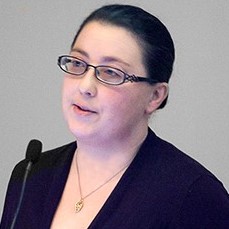PAID MESSAGE
As a senior clinical research data manager at the University of Chicago Medical Center, Melissa McHugh reviews and enters patient data for clinical trials for pharmaceutical companies as part of the genitourinary oncology program. With much of her work centered around data, she began seeing the value several years ago of returning to school to pursue an analytics-related degree.
After researching the various options she had in the Chicago area, she discovered the University of Chicago’s Master of Science in Biomedical Informatics (MScBMI) program, which very quickly became the clear choice for her return to school.
Having been a physics major as an undergraduate, she enjoyed the math that appeared from time to time in her classes, but she had wondered about before beginning the program how she would take to the classes in computer programming. She admits that her earlier experiences learning to code while an undergraduate had left her slightly less than overjoyed.
It came as a delightful surprise then that the class taught by Anoop Mayampurath, PhD, entitled Intermediate Applied Data Analysis stood out among those she has taken so far as one of her favorites. In it she was introduced to the R programming language and in the final project for the class, she used the language to reach conclusions using data from a real-world situation.
“It was a challenge,” she says, “but the class was pitched to people at all different levels and backgrounds and by the end I really felt like I’d learned a lot. I enjoy using R now. It was particularly rewarding to do a full experiment like that working with a real data set and real-world scenario.”
Already having submitted her proposal for her capstone project, Melissa intends to work within her office at the University of Chicago Medical Center designing a research note template that researchers can use to pull reports directly from EPIC. “As we do it now,” she explains, “it involves manually entering patient data into another database before you can run reports and perform analyses. My project will make the data management process much more efficient.”
Looking ahead, Melissa knows she will graduate with a skillset exceeding the requirements of her in her present position, but she is looking forward to the prospect of moving on and exploring new career options—possibly at UChicago, though possibly elsewhere as well. Among the classes she still has to take before she graduates, she points to one focused on bioinformatics that she is particularly looking forward to and which she hopes might further illuminate some fascinating developments taking place today about the trajectory she is already on.
“It will be focused on visualizing and analyzing genomic data,” she says, “which relates in interesting ways to the cancer research I’m working with now. At the same time, the BMI program has already shown me how the field is presently growing and all the new career possibilities emerging within it, so I’m looking forward either way to what will open up for me in the future.”
Click here for more information on the University of Chicago Master of Science in Biomedical Informatics program, including details on an Instructor Meet and Greet to be held on June 11 in downtown Chicago, the Biomedical Informatics Capstone Projects, and Degree Concentrations.




